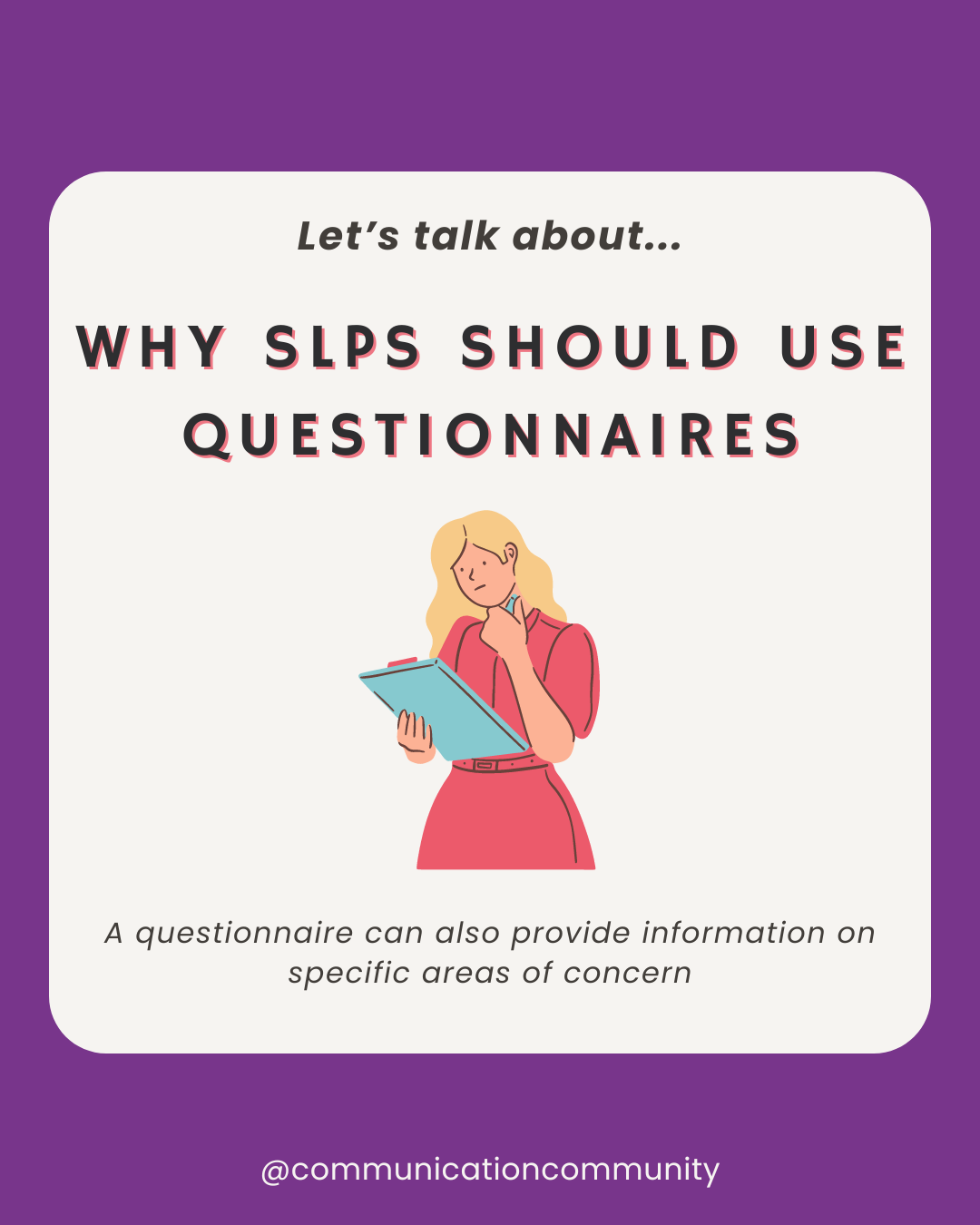

Parents, caregivers, and teachers should have opportunities to provide input about an individual’s skills when a speech-language pathologist (SLP) is completing a comprehensive assessment. This post covers what types of questions SLPs can ask parents, caregivers, and teachers.
There are many parts of a comprehensive speech and language assessment. What is required and what is included may vary depending on the setting the assessment is in (e.g. school, outpatient clinic), but typically there are a variety of informal and formal measures used.
The purpose of an assessment is to determine whether or not an individual has a speech or language delay or disorder, and if there is one present, how it can be addressed. While an SLP can administer formal, standardized, norm-referenced assessments, analyze speech and language samples, and provide dynamic assessment, they cannot be with an individual at all times of the day in order to see how they communicate across all contexts and settings. They also cannot look into a crystal ball and know the complete case history of an individual or what their teachers observe in class.
In order to obtain information on an individual, SLPs can use questionnaires or surveys to learn about the individual they are assessing.
Questionnaires are most often administered before, during, and after the delivery of assessments. Parent, caregiver, and teacher involvement is an important part of completing an assessment.
Questionnaires can be helpful at many stages of an evaluation, though they are definitely necessary at the beginning of one, especially if the individual has never received speech and language services before. Before the SLP determines how they are going to assess an individual, they need some basic information on what the individual’s present level of performance is and what areas of concern there may be. They also need to know what languages the individual speaks and how they communicate. For example, if an individual is exposed to more than one language at home, a standardized assessment may not be the most appropriate assessment tool to use. If the information gathered indicates that an individual has complex communication needs and primarily communicates through augmentative and alternative communication (AAC), the SLP will be able to better plan for an assessment of the individual’s skills.
A questionnaire can also provide information on specific areas of concern. The scope of speech-language pathology is large, so if an individual is receiving an evaluation because of concerns about their production of speech sounds, it will look different than an evaluation because of concerns about their use of language. Questionnaires completed beforehand can give the SLP a better sense of what diagnostic tools to pull to obtain the most efficient and comprehensive assessment results.
Questionnaires may also be warranted in the middle of an assessment. For example, an individual may be referred for an evaluation due to concerns about their speech sound production, but while completing it, the SLP may notice a large number of disfluencies. The SLP may check in with someone who knows the individual better, like a parent or teacher, and ask them if they’ve noticed disfluencies as well. The SLP may decide to also assess an individual’s fluency skills to determine whether or not they have a fluency disorder (i.e., stutter/clutter).
An SLP may complete an assessment and determine that an individual does present with a speech or language delay or disorder. At this point, they are likely going to develop a treatment plan for them and may ask for input on goals or areas of growth. Ultimately, it is the SLP who is going to write the goals and develop the treatment plan, but they should consult with others regarding what type of treatment an individual and their family desires. This may mean the type of AAC system an individual is going to use or the frequency/duration of services. If the individual is in school, the SLP may consult with the teacher about curriculum expectations or accommodations that may be most appropriate for the individual.

Depending on the suspected area of concern, there are certain questions you may ask. It is important to touch on all areas of speech and language, but if there is a suspected fluency disorder you should ask specific questions related to stuttering/cluttering. If there is a suspected speech sound disorder, you should ask specific questions related to articulation and phonology. The following provides some questions you can ask, along with other topics to cover.
*Depending on the setting you are in, you may be able to find out some of this information on your own. For example, if you are in a school, you may be able to see what type of accommodations they have used, if they’ve received speech and language services in the past, or if they have passed prior hearing screenings.

These touch on some specific areas of speech and language, including speech sounds, pragmatic language, receptive and expressive language, fluency, and voice:
-their intelligibility among familiar and unfamiliar communication partners
-awareness of speech sound errors
-sounds that are present
-sounds that are absent
-frustrations around communication due to speech sound errors
-answering wh- questions (who, what, where, when, why)
-ability to understand what others are saying
-understanding what’s occurring in books, TV shows and movies
-primary mode of communication
-average length of utterances (e.g. 1-2 words, phrases, complete sentences)
-ability to communicate feelings, wants, concerns
-understanding facial expressions/nonverbal communication
-understanding abstract/figurative language (for older students)
-play skills with others
-developing and maintaining peer friendships
-using an appropriate tone of voice
-participating in classroom activities/discussions
-working in groups/with others
-presence of disfluencies/not smooth speech
-types of disfluencies (blocks, repetitions, prolongations)
-awareness of disfluencies
-impact of communication with others
-emotions related to fluency
-possible family history?
-volume of speech
-pitch of speech
-impact on communication
It would be impossible to name every question that should be asked that spans across all ages and areas of concern, but we hope this provides a good “jumping off” point for you as you develop questionnaires and checklists for others. As a parent/caregiver, this may provide some good insight as to what an SLP may be looking for when they are completing an assessment.
The link has been copied!